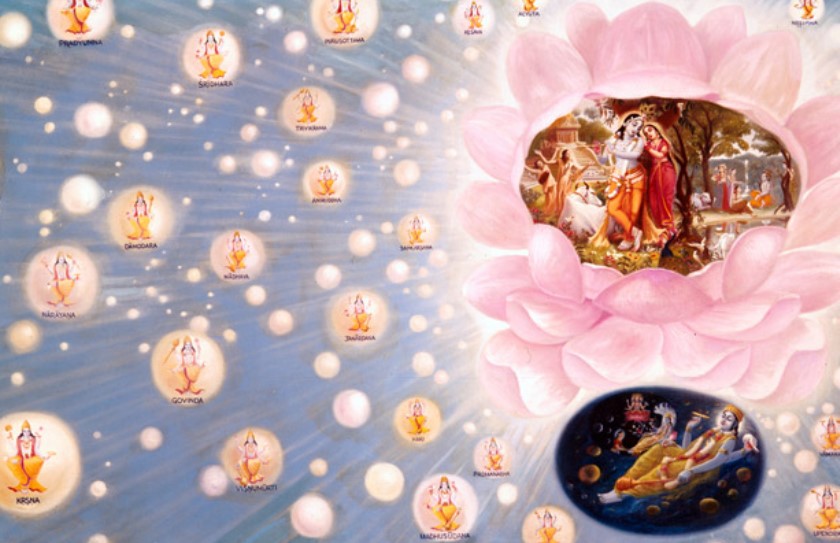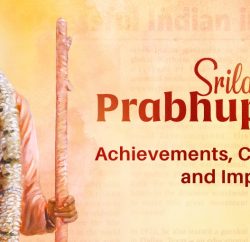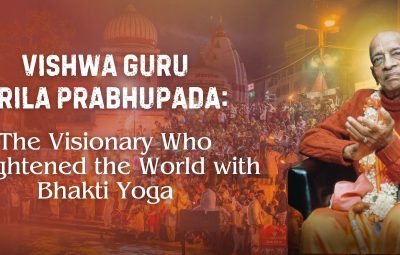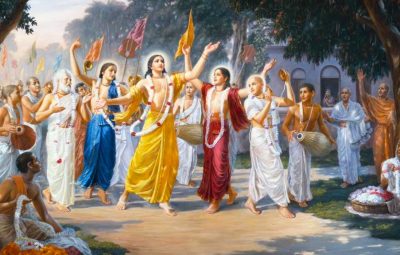A concise summary of the five principal spiritual topics discussed in the Bhagavad-Gita is presented in this article.
Five thousand years ago, the sublime spiritual knowledge of Bhagavad-gita was spoken by Sri Krishna, the Supreme Personality of Godhead to His dear devotee Sri Arjuna, on the Battlefield of Kurukshetra. Bhagavad-gita stands as the supreme literature as these principles of religion were enunciated by God Himself.
There are five main themes illustrated in the Bhagavad-gita. They are:
- Ishvara – The Supreme Lord
- Jiva – The Living Entity
- Prakruti – The Material Nature
- Kala – Time and
- Karma – Activities
Table of Contents
1. Ishvara – The Supreme Lord
A beautiful rose flourishing in the garden does not appear spontaneously; it has an origin—the seed. This concept extends to everything in the world, where each object is not self-originating but emerges from a source. Just as a painting requires a painter, the creation has a creator, revealing that it does not manifest on its own.
What is the origin of this creation? The Bhagavad-gita asserts that God is not only the source but also the sustainer and destroyer of the entire creation. Everything emanates from Him. When witnessing awe-inspiring events in nature, it is crucial to recognize that there is a governing force behind these cosmic manifestations.

In the Bhagavad-gita, the Supreme Personality of Godhead, Krishna, is mentioned as Bhagavan by Srila Vyasadeva, and acknowledged by various personalities, including Lord Brahma, Lord Indra, Narada Muni, Asita, Devala, and revered Acharyas such as Adi Shankaracharya, Sri Ramanujacharya and Sri Madhvacharya. In the Bhagavad Gita, Arjuna directly addresses Sri Krishna as the Supreme Person. Lord Krishna Himself affirms that He is the ultimate creator of all planets, the enjoyer of all sacrifices, and the friend of all living entities. Throughout the Bhagavad-gita, He is referred to as Brahman, Paramatma, and Maheshvara, signifying His supreme control. Thus, we can know about the Supreme Lord’s position, who is the Ishvara, master of everything.
2. Jiva – The Living Entity
In the second chapter of the Bhagavad-gita, Lord Krishna elaborates on the distinct nature of each living entity, emphasizing the separation between the eternal soul and the temporary body. He delves into the intricate details of the soul’s existence, its qualities, and various other aspects. Further, the Lord elucidates the process by which living entities enter the material world, the determinants of their specific bodies, and the ensuing experiences of joy and suffering.

In the 14th chapter, the Lord elaborates about His energies manifested through the three modes of material nature—Sattva-guna, Rajo-guna, and Tamo-guna. The chapter describes how these modes influence the living entity and shape their experiences and way of life.
Additionally, the Bhagavad-gita provides a comprehensive knowledge of spiritual liberation, outlining the path by which individuals can break free from the cycle of birth and death, attaining eternal life in the kingdom of God, devoid of worldly miseries. This profound wisdom in Lord Krishna’s teachings offers a transformative perspective on life and death.
3. Prakruti – The Material Nature
The captivating and intricate workings of nature, encompassing both living and non-living entities, are a marvel to behold. When witnessing extraordinary occurrences in the cosmic realm, it is imperative to recognize the presence of a controller orchestrating these wonders. Disregarding the role of the controller is akin to a child’s perspective about a high-speed motorcar. Although the engineering marvel of the car is evident, a discerning adult understands that, despite the intricate arrangements, it cannot function without a driver.
In this age dominated by machinery, it is crucial to acknowledge that there is a driving force behind every mechanical marvel, including motorcars and electric powerhouses. The day may be marked by machinery, yet the timeless truth remains—there is always a guiding force. The Supreme Lord serves as the ultimate driver, the Adhyaksha, overseeing and directing the seamless operation of everything in the universe. Understanding how material nature operates under the guidance of the Supreme Lord is a crucial theme in the Gita.
4. Kala – Eternal Time
Time governs all our actions and experiences in life. Lord Krishna in the Gita says that He is time, and its inherent nature is such that it remains unconquerable. Time is an energy beyond conquest but can be effectively managed through careful planning.
The Gita provides a remarkable elucidation on the concept of time, covering the duration of the entire universe and eternal time. It beautifully explores the manifestation of material nature and the enduring nature of time itself.

In our experience, we can only recall certain aspects of our past, present, and future. However, the Lord possesses the ability to remember everything, highlighting the fundamental distinction between Him and us.
5. Karma – Activities
Karma, denoting activity, permeates every aspect of the universe and cosmic manifestation. Living beings are notably engaged in diverse activities.
Consider a scenario where one diligently works and amasses considerable wealth, enjoying the fruits of his labour, or conversely, invests a significant amount in a business that fails, resulting in suffering. This enjoyment and suffering based on our actions is referred to as karma.

While the Lord, the living entity, material nature, and time are eternal, karma, the fifth element, is not. Although we may be experiencing the consequences of our actions since time immemorial, the effects of karma are not eternal. The Bhagavad-gita imparts instructions from the Supreme Lord, providing the opportunity to alter the outcomes of our actions and, thereby, our destiny.
Srila Prabhupada explains, “One will find in the Bhagavad-gita all that is contained in other scriptures, but the reader will also find things which are not to be found elsewhere. That is the specific standard of the Gita. It is the perfect theistic science because it is directly spoken by the Supreme Personality of Godhead, Lord Sri Krishna.”
By reading and following the profound teachings of the Gita, the source of timeless wisdom, we can illuminate our path to enduring joy and fulfilment – thus ensuring a life of happiness in both the present and the future.
Related Links: Why Bhagavad-gita As It Is | Glories of Reading Bhagavad-gita | Five Topics of Bhagavad Gita | Gita Jayanti | Support Bhagavad Gita distribution | Buy Bhagavad Gita online











